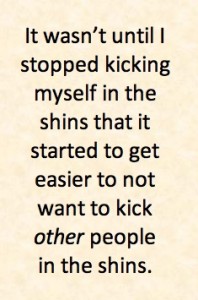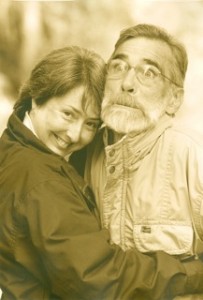Compassion has recently been a recurring theme for me. I noticed this after I published a blog post titled Stop Making Sense on the ridiculously stupid decisions that pass for logic sometimes, especially in a bureaucracy. In that post, I told two (true) stories that made me shake my head for years. I had started the post some time ago, but I couldn’t finish it for a long time. Why? Because I couldn’t get past it being a rant. I was left with a big “So What?” by my own post.
I hate it when that happens.
Scene Change
 I discovered Pema Chodron several years ago (thanks to Bill Moyers’ PBS series “On Faith and Reason”), and one of the things that appealed to me about her, and about Buddhism in general, was her focus on compassion, or “loving kindness.” Especially toward ourselves. But it wasn’t until recently when I went through a process of coming to terms with a vocal condition that makes it difficult for me to speak, admitting how I truly hated my voice and choosing instead to be compassionate with myself and my voice, that the concept of compassion went from being a “Yeah, that’s nice,” abstract concept to something real.
I discovered Pema Chodron several years ago (thanks to Bill Moyers’ PBS series “On Faith and Reason”), and one of the things that appealed to me about her, and about Buddhism in general, was her focus on compassion, or “loving kindness.” Especially toward ourselves. But it wasn’t until recently when I went through a process of coming to terms with a vocal condition that makes it difficult for me to speak, admitting how I truly hated my voice and choosing instead to be compassionate with myself and my voice, that the concept of compassion went from being a “Yeah, that’s nice,” abstract concept to something real.
In other words, it wasn’t until I stopped kicking myself in the shins every time a word wouldn’t come out or I struggled to make myself understood, that it started to get easier to not want to kick other people in the shins.
Case in Point:
That blog post. I couldn’t finish it for the longest time because I still wanted to shake the silly bureaucrats who make decisions like the ones I described. And I didn’t know how to get past that – until it occurred to me that they were (possibly) trying to do a good job – but maybe they were hampered by a variety of unexamined beliefs that led them to their conclusions. (I confess I am still tempted to say, “a variety of mistaken beliefs that led them to their ridiculously stupid and counter-productive conclusions.” I still have work to do.)
Which reminded me of an essay I read a while back, written by Indra Nooyi, Chairman and CEO of Pepsico. In her essay, “The Best Advice I Ever Got,” she wrote about how she learned from her father to “assume positive intent.”
That’s when I was able to finish the blog post.
And I was actually pretty proud of that post. I thought it was well written, it had a catchy title, and it wasn’t a rant. It offered something practical about getting past being stuck when dealing with those ridiculously stupid and counter-productive conclusions.
But it got no comments. None. Zero. A big goose-egg. “Waah!” I thought, “I stink as a blogger!” But my posts on “What Spiders Teach Us About Building a Great Team” and “Bobby Fischer Teaches Systems Thinking” got comments. So what happened?
Maybe compassion just isn’t catchy. Maybe I didn’t make it catchy. Maybe I should have admitted how HARD it was for me to get to that point – a little confession might have been catchier. Humility can be very funny, sometimes.
So, I’ll put on a big red clown nose and admit that being a change agent is HARD. (Actually, just being a decent person is hard.) And it’s hard because in order to be any kind of effective, I have to be compassionate, not superior. (That’s one difference between being a Consultant and being an “Insultant.”) I have to be aware of my own stuff and be able to meet people where they are, not where I think they are.
There is a big difference between compassion and pity, between being compassionate with myself and indulging in self-pity, and between having compassion for others and being patronizing. Compassion does not allow us to collude with bureaucracy and mistaken beliefs, nor does it allow us to judge those with whom we disagree. Compassion is a pain in the ass, actually, because it strips away our ability to simply react and take the easy way.
But compassion is also what makes it possible for us to consciously use ourselves, and it gives us room to learn from the differences between us, to ask for the sound and current data that is needed to replace unfounded beliefs, and to play infinite win/win games instead of win/lose power games.
In other words, compassion is one of the things that makes curiosity possible.
Now that makes sense.
What do you think? Please leave a comment.



 Twitter
Twitter LinkedIn
LinkedIn Facebook
Facebook